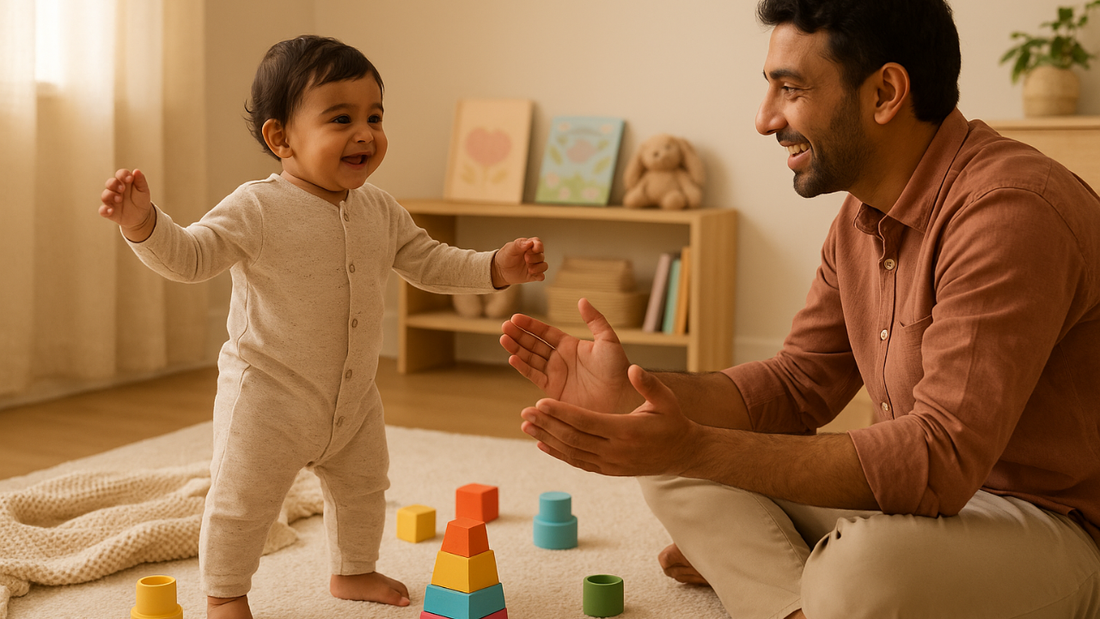
When Baby Becomes Toddler: A Parent’s Guide to Smooth Transitions
LiLLBUDDuring the baby months, you cuddle, feed, and see your first smiles. Then, almost overnight, your child starts to walk, talk, and explore. That's when you know you've entered the toddler stage. This change usually happens between 12 and 18 months, and while it's exciting, it can also make you wonder:
- "How do I keep up with my toddler's energy?"
- "Should I be worried if my kid isn't talking yet?"
- "How do I deal with all these new feelings?"
Take a deep breath. You're not the only one. This stage isn't about being perfect; it's about helping your child with play, structure, and patience.
Understand What's Changing and Why It Matters
The world of your toddler just got bigger! Here's what's going on beneath the surface:
- Milestones in the body: Standing, walking, climbing, and being curious all the time.
- Cognitive leaps: Understanding how things work and how they affect each other.
- Language development: Learning to talk and follow simple directions.
- Being aware of your social and emotional needs: wanting to be independent but still needing comfort.
Instead of rushing through milestones, try to focus on practicing opportunities like reading, playing, and gentle encouragement every day.
Make the space safe and fun for toddlers
As your child learns to walk, your home becomes their playground. Here is how to get them ready to explore safely:
- Make your space safe for babies again: You might not think toddlers can reach higher and move faster than you think!
- Rotate toys: Put some away and keep some out. This keeps the game fun and interesting.
- Offer open-ended toys: Blocks, stacking rings, and nesting cups help kids use their imaginations and solve problems.
Tip for parents: Give your toddler a "yes space," which is a safe place where they can touch, climb, and explore anything.
Foster Emotional Development through Connection
Your little one is starting to feel emotions more intensely, but they might not yet know how to express them. Brace yourself for those tantrums, clingy moments, and plenty of "No!" outbursts. Here’s how you can support them:
- Name their feelings: "I can see you're upset because playtime is over."
- Offer comfort first: Before trying to change their behavior, connect with them on an emotional level.
- Keep it consistent: Simple routines help them feel secure.
Remember: Your calmness serves as their anchor. Your toddler learns to manage their emotions by observing how you stay composed.
Help with language and thinking skills
Communication skills develop fast during this stage. Boost this learning with simple, everyday habits.
- Make reading a daily routine. Point to the illustrations and name the objects you see. Repeat those key words often while you read. This repetition solidifies new vocabulary.
- Sing songs and recite simple rhymes. The natural rhythm helps children remember things. Rhythm also makes it easier for your child to speak clearly.
- Talk about the routines, like "We're washing your hands; now let's dry them!"
Guiding Tip: Stop talking for a moment. Giving your toddler time to answer helps them feel more confident and learn.
Keep Routines Predictable but Flexible
Toddlers feel safe when they have a routine, but being flexible keeps things calm.
Stick to regular times for meals and naps.
- Give transitions in a calm way, like "We'll go for a walk after snack."
- Let your child choose between two simple things, like "Blue shirt or yellow one?"
Tip: give visual or verbal cues, like "Last page, then bedtime!" It makes people work together instead of fighting for power.
Celebrate the Little (and Big) Wins
It all counts: walking across the room, saying "Mama," and stacking two blocks. Give them a cheer. Clap. Smile. Your reaction gives them more confidence.
Tip: Don't compare. Every toddler learns at their own pace, and every path is right for them.
Look after yourself as well
The toddler stage is busy, messy, and full of surprises, but it's also magical. You are learning with your child. So take a break, breathe, and tell yourself that you're doing a great job. Make time for yourself by having a quiet cup of coffee, going for a walk, or reading for a few minutes. A toddler who is calm is a confident one.
Grow together
When your baby becomes a toddler, it’s a milestone for both of you. This new chapter is all about guidance, patience, and connection. When you remember that your child doesn't need a perfect parent, just a present one, every problem gets easier. Ask yourself:
- What can I do to make today feel happy instead of rushed?
- What new skill can I let my toddler learn on their own?
Keep leading, keep watching, and keep celebrating every little step forward. This is a very special time.

